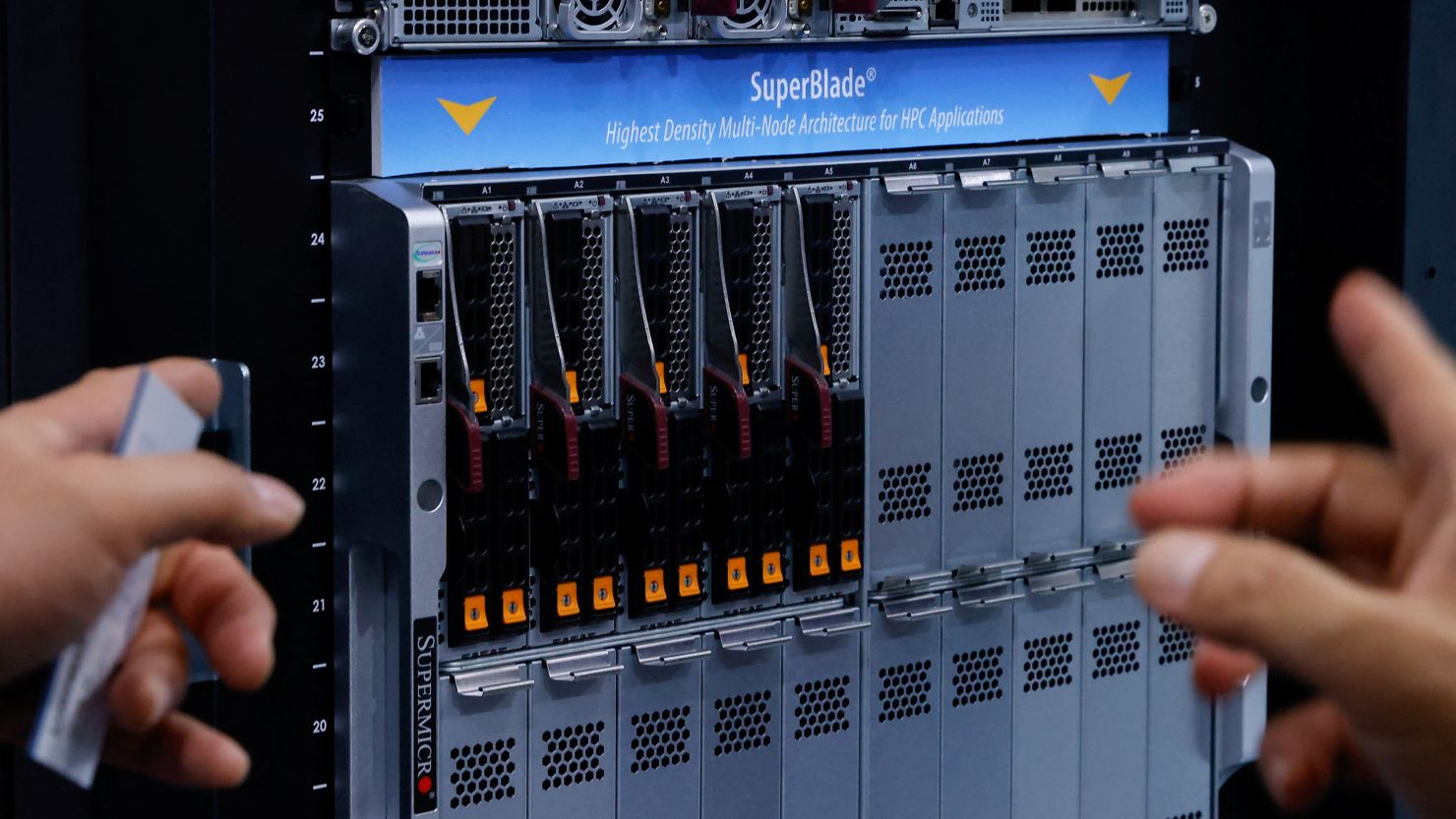A version of this story first appeared in CNN Business’ Before the Bell newsletter. Not a subscriber? You can sign up right here. You can listen to an audio version of the newsletter by clicking the same link.
Nvidia isn’t the only stock capturing the attention of AI enthusiasts these days.
Nvidia is undoubtedly the poster child for artificial intelligence. Shares of the American chipmaker have soared roughly 277% over the last 12 months, helping drive a powerful bull market that’s led stocks to record highs. Nvidia closed above a $2 trillion market cap on March 1, joining an elite cohort including Apple and Microsoft.
But there’s another AI-related stock that has quietly logged eye-popping gains.
Shares of Super Micro Computer (SMCI) have surged about 296% so far in 2024, following a 246% jump in 2023. Supermicro’s stock gained even more momentum in January, after the company reported second-quarter results that blew past expectations and raised its full-year revenue forecast.
Supermicro’s stock was one of the most popular names bought by Charles Schwab clients in February, according to the firm’s latest trading activity index.
The server producer counts Nvidia (NVDA) and Advanced Micro Devices among its customers. Its stock had risen at a breakneck pace even before last year’s bull market. The shares jumped roughly 87% in 2022, while other tech names and the broader market got pummeled as the Federal Reserve raised interest rates aggressively to bring down wayward inflation.
Supermicro’s runaway gains are indicative of the burgeoning demand for high-quality infrastructure to support AI chips, after the creation of OpenAI’s ChatGPT in November 2022 kickstarted a race among tech behemoths to develop generative AI platforms and tools.
Nvidia has been the biggest beneficiary of the AI boom. The chipmaker, which produces processors that power AI systems, reported last month that its full-year profits grew more than 580% from the prior year.
“Everyone’s looking for something that looks and smells and tastes like Nvidia. … [Supermicro] is exactly that,” said Victoria Bills, chief investment strategist at Banrion Capital Management.
Supermicro has a market cap of roughly $63 billion, up from $5 billion just a year ago. The stock is set to join the benchmark S&P 500 index at its next quarterly rebalance.
Wall Street thinks it has more room to run. Bank of America analysts initiated coverage on Supermicro last month with a “buy” rating and price objective of $1,040, which the stock has already surpassed, closing at $1,124.70 a share on Wednesday. Wells Fargo and Goldman Sachs analysts also recently initiated coverage.
“The company’s willingness to experiment with different combination of components, its close proximity to leading semiconductor companies in San Jose and the fact that a majority of its manufacturing is in the United States is a competitive advantage,” wrote BofA analysts in a February 15 report.
New York Community Bank gets $1 billion ‘lifeline’
Beleaguered regional lender New York Community Bank is receiving a more than $1 billion equity investment, reports my colleague Elisabeth Buchwald.
The majority of the investment, $450 million, is coming from former Treasury Secretary Steven Mnuchin’s firm, Liberty Strategic Capital. The remaining sum will come from Hudson Bay Capital, Reverence Capital Partners, Citadel Global Equities and “other institutional investors and certain members of the Company’s management,” according to an announcement NYCB made Wednesday afternoon.
The bank’s stock plunged more than 40% earlier on Wednesday after The Wall Street Journal reported that the bank was seeking a major cash infusion. After the deal was announced, the stock shot up 31% but those gains quickly leveled off. Ultimately, shares of NYCB closed 7% higher for the day after trades settled.
The money “provides a lifeline,” David Chiaverini, managing director of equity research at Wedbush Securities, told CNN.
In addition to the investment, NYCB announced Joseph Otting, a former comptroller of the currency, will replace Alessandro DiNello as CEO. DiNello, who was named CEO less than a week ago, will now become non-executive chairman.
Cash-strapped Britain cuts taxes for workers as election looms
UK finance minister Jeremy Hunt announced a tax cut for workers Wednesday as he unveiled what is likely to be the government’s last budget before a general election later this year, reports my colleague Hanna Ziady.
Hunt cut national insurance — a levy paid by people who work — by two percentage points. That means an additional £450 ($572) a year for the average employee or £350 for someone who is self-employed. It’s the second such cut in a matter of months.
“If we want to encourage hard work, we should let people keep as much of their own money as possible,” Hunt said.
But soaring UK government debt, crumbling public services and a lackluster economy left the chancellor with very little room for further substantial giveaways.
The economy barely grew in 2023, slipping into recession at the end of the year in stark contrast with Prime Minister Rishi Sunak’s pledge to generate growth. In 2024, the Bank of England sees output expanding just 0.25%, while the International Monetary Fund has forecast growth of 0.6%.
Hunt’s Conservative Party is trailing the opposition Labour Party by a wide margin in opinion polls, which had put him under enormous pressure to unveil tax cuts — however small — in a last-ditch bid to win voters.








